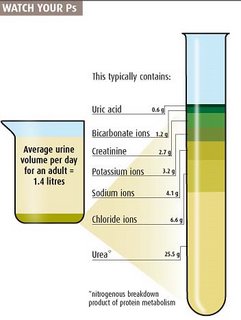Pee-cycling

You recycle your household waste. You buy locally grown food, fit low-energy light bulbs and try not to use the car unnecessarily. Maybe you even irrigate the garden with your bath water. But you've still got an environmental monster in your house. Your toilet is wrecking the planet.
Before you point to the brick you've put in the cistern, it's not about the water - well, not entirely. The big problem is pee. Your pee. Do you flush it away without a second thought? Tsk, tsk. Lose the green halo.
At first sight urine looks like an unlikely environmental menace. What harm could come from flushing away a fluid that is mostly water, plus a smidge of proteins and salts? Surprisingly, the answer is "a lot".

The problem with urine is that it is the main source of some of the chemical nutrients that have to be removed in sewage treatment plants if they are not to wreck ecosystems downstream. Despite making up only 1 per cent of the volume of waste water, urine contributes about 80 per cent of the nitrogen and 45 per cent of all the phosphate. Peeing into the pan immediately dilutes these chemicals with vast quantities of water, making the removal process unnecessarily inefficient.
To be fair, if you use conventional western plumbing there's not an awful lot you can do about your personal pee-print right now. A lucky few, however, live or work in one of the buildings in continental Europe where you can find a future must-have eco-accessory: the urine separation toilet. These devices divert urine away from the main sewage stream, allowing the nutrients to be recycled rather than treated as waste. They could solve all the environmental problems associated with urine and even turn sewage plants into net producers of green, clean energy.
from the New Scientist


0 Comments:
Post a Comment
<< Home